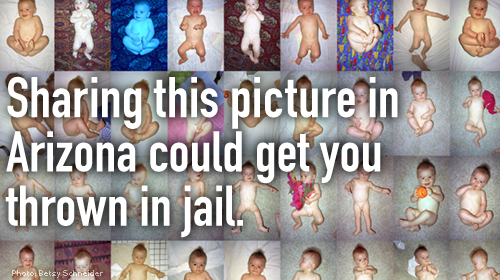Posted on
January 6, 2015 in

This could land you in prison in #AZ via @berkitron https://t.co/BICDqe4XUa
— ACLU National (@ACLU) September 23, 2014
That’s a tweet from the American Civil Liberties Union. The link within it is to a blog post written by Lee Rowland (@berkitron), Staff Attorney, ACLU Speech, Privacy & Technology Project.
Sharing that image would be “disclos[ing] an image of another, identifiable person, whose intimate parts are exposed … when the actor knows or should have known that the depicted person has not consented to such disclosure.”
Disclosing an image of another identifiable person whose intimate parts are exposed when you should have known that the person has not consented to the disclosure would violate the model revenge-porn statute proposed by Mary Anne Franks.
So in Franks’s perfect world, as in Arizona, sharing that image would be a crime unless it were done “in the public interest.”
Go figure.



Come on. Her statute says it has to be an identifiable person. Can you identify any of those babies? Moreover, why isn’t it in the public interest for people to continue to engage in sharing harmless pictures of innocent kids? Enough with the silly arguments.
Your obsession with Franks is just plain weird. It’s mostly male legislators who draft and support these laws, yet you ignore them while posting about her again and again. She’s not a legislator. She doesn’t write the laws.
You remind me of a seventh grader who got turned down for the big dance. Man up Bennett.
Derek, until your second paragraph I thought you were being facetious. Apparently you were not.
Let me be the first to welcome you to Planet Reason. “Identifiable” doesn’t mean “identifiable to Mark Bennett” or “identifiable to lots of people.” If someone could look at the picture and know who the person was, the person is identifiable. So yes, this baby is identifiable. Whether a particular sharing of a particular image is “in the public interest” doesn’t depend on whether the genre, “harmless pictures of innocent kids” is “in the public interest.” One court’s definition of “in the public interest” was “affects the community or society as a whole.” If A sends this image to B, it doesn’t affect the community or society as a whole.
All authoritarians share your delusion: that nobody with the coercive power of the state is likely to ever disagree with what they say words mean. But the fact that you might think sending a naked baby picture is somehow in the public interest has nothing to do with whether some Alabama prosecutor who doesn’t share your liberal view might charge someone who you wouldn’t charge.
Franks has chosen to be the public face of a movement to criminalize a broad swath of constitutionally protected speech. She is pushing a harmful agenda in every legislature in the US. Statutes get written by committees. The Arizona statute, which is already dead in the water, was based on Franks’s model statute. It’s not exactly the same, but the distinctions aren’t constitutionally significant. Law profs are afraid to publicly say that Franks’s ideas are dangerous to free speech because, like you, she tries to make the argument about the person rather than the ideas, accusing her detractors of misogyny.
I care enough about freedom of expression that I will keep carrying on despite you. I invite you to avert your eyes.
[…] commenter here asked, “why isn’t it in the public interest for people to continue to engage in sharing harmless […]
[…] That statute hasn’t been written yet. Mary Anne Franks’s model statute, for example, would capture the innocent behavior of sharing naked baby pictures. […]
[…] Of course, as Mark W. Bennett can tell you – because he’s fought an attempt to criminalize speech, and won – this could change. […]